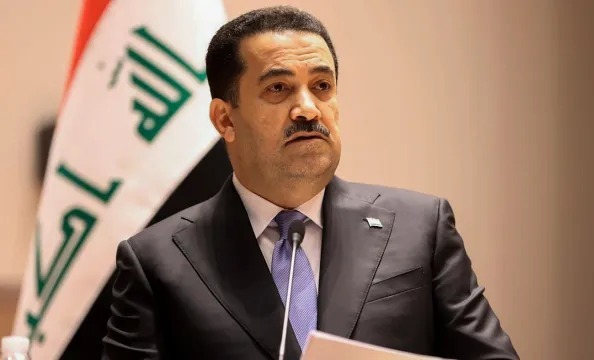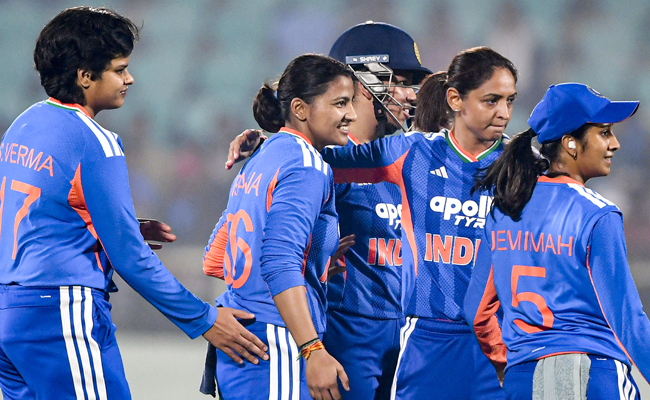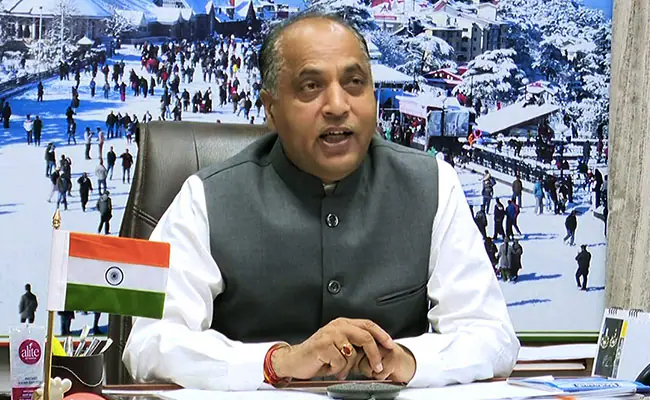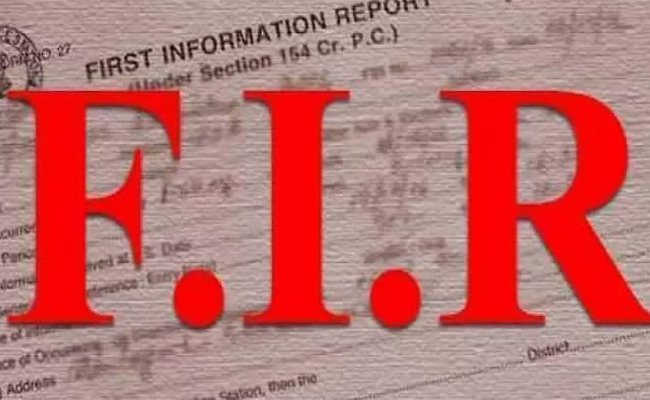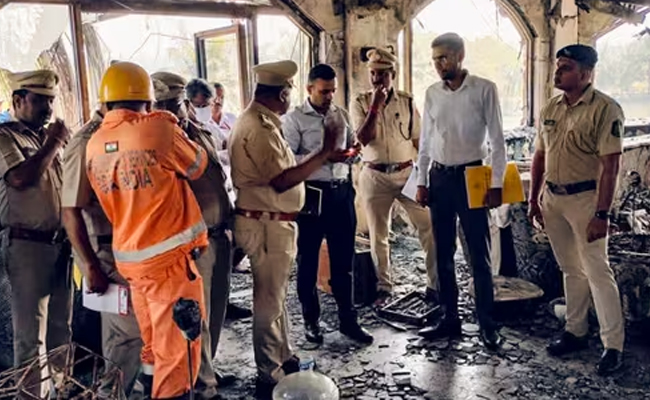Washington (AP): President Joe Biden is hosting Iraq's leader at the White House as fears grow for a major escalation in Mideast hostilities following Iran's weekend attack on Israel.
Biden was to meet Monday with Iraqi Prime Minister Mohammed Shia al-Sudani for talks intended to focus primarily on US-Iraq relations, which had been scheduled well before the Iranian strikes.
But Saturday's drone and missile launches, including some that overflew Iraqi airspace, have underscored the delicate relationship between Washington and Baghdad, not least because of Iranian proxy groups that operate in Iraq.
The sharp increase in regional tensions over Israel's war in Gaza and the weekend developments has raised further questions about the viability of the two-decade American military presence in Iraq. However, a US Patriot battery in Irbil, Iraq, did knock down at least one Iranian ballistic missile, according to American officials.
Meeting with Iraqi Deputy Prime Minister Muhammad Ali Tamim before Biden's session with al-Sudani, Secretary of State Antony Blinken said the US was urging all parties to avoid escalation.
“In the 36 hours since, we have been coordinating a diplomatic response to seek to prevent escalation,” he said. “Strength and wisdom need to be different sides of the same coin.”
Tamim said the Iraqi government was equally concerned.
“The Middle East today is living in exceptional circumstances that have repercussions on our nations, and we hope escalations and tensions in the area will end," he said.
"The government in Iraq is warning about escalation and the area being dragged into wider war that will threaten international security and safety. And therefore, we call on all parties for self-restraint and to respect the rules of diplomacy and international laws,” Tamim said.
Complicating matters, Iranian proxies have initiated attacks against US interests throughout the region from inside Iraq. Those ongoing strikes have made US-Iraq discussions about regional stability and future US troop deployments all the more critical.
Monday's talks will also focus on economic, trade and energy issues that have become a major priority for Iraq's government, according to US officials.
The US and Iraq began formal talks in January about ending the coalition created to help the Iraqi government fight the Islamic State, with some 2,000 US troops remaining in the country under an agreement with Baghdad. Iraqi officials have periodically called for a withdrawal of those forces.
The two countries have a delicate relationship due in part to Iran's considerable sway in Iraq, where a coalition of Iran-backed groups brought al-Sudani to power in October 2022.
The US in recent months has urged Iraq to do more to prevent attacks on US bases in Iraq and Syria that have further roiled the Middle East in the aftermath of Hamas' October 7 attack on Israel. Iran's weekend attacks on Israel through Iraqi airspace have further underscored US concerns, although al-Sudani had already left Baghdad and was en route to Washington when the drones and missiles were launched.
The US has also sought to apply financial pressure over Baghdad's relationship with Tehran, restricting Iraq's access to its own dollars in an effort to stamp out money laundering said to benefit Iran and Syria.
Most previous Iraqi prime ministers have visited Washington earlier in their tenure. Al-Sudani's visit was delayed because of tensions between the US and Iran and regional escalation, including the Gaza war and the killing of three US soldiers in Jordan in a drone attack in late January. That was followed by a US strike that killed a leader in the Kataib Hezbollah militia whom Washington accused of planning and participating in attacks on US troops.
Al-Sudani has attempted to maintain a balancing act between Iran and America despite being seen as being close to Tehran and despite several incidents that have put his government in an embarrassing position in relation to Washington.
Early in his term, a US citizen, Stephen Edward Troell, was shot and killed by armed men who accosted him as he pulled up to the street where he lived in Baghdad's central Karrada district with his family. An Iraqi criminal court convicted five men last August and sentenced them to life in prison in the case, which officials described as a kidnapping gone wrong.
A few months later, Elizabeth Tsurkov, an Israeli-Russian doctoral student at Princeton, was kidnapped while doing research in Iraq. She is believed to be held by Kataib Hezbollah. The senior US official said Tsurkov's case would also be raised during al-Sudani's visit.
Al-Sudani started his term with promises to focus on economic development and fight corruption, but his government has faced economic difficulties, including a discrepancy in the official and market exchange rates between the Iraqi dinar and the US dollar.
The currency issues resulted in part from a US tightening of the dollar supply to Iraq, as part of a crackdown on money laundering and smuggling of funds to Iran. The US has disallowed more than 20 Iraqi banks from dealing in dollars as part of the campaign.
The al-Sudani government recently renewed Iraq's contract to purchase natural gas from Iran for another five years, which could lead to American displeasure.
The Iraqi prime minister will return to Iraq and meet with the Turkish president following his trip to Washington, which could finally lead to a solution to a long-running dispute over exports of oil from Kurdish areas of Iraq to Turkey. Washington has sought to get the flow of oil to resume.
Let the Truth be known. If you read VB and like VB, please be a VB Supporter and Help us deliver the Truth to one and all.
Visakhapatnam (PTI): Shafali Verma hit a blistering unbeaten 69 as India made short work of a paltry target to outclass Sri Lanka by seven wickets in the second Women’s T20 International here on Tuesday.
India now lead the five-match series 2-0 after another one-sided victory, having restricted Sri Lanka to a modest 128 for 9 through a collective display of disciplined bowling from the spin trio of seasoned Sneh Rana, ably complemented by young spinners Vaishnavi Sharma and Shree Charani.
During the chase, vice-captain Smriti Mandhana (14) fell cheaply but Shafali, enjoying new found confidence after a stellar show in the World Cup final, sent the bowlers on a leather-hunt during her 34-ball knock, winning it for her team in just 11.5 overs.
The hosts have now completed back-to-back successful chases within 15 overs which speaks volumes about the unit's sky-high confidence.
Shafali's innings had 11 punchy boundaries apart from a maximum.
The floodgates opened when left-arm spinner Inoka Ranaweera bowled a few flighted deliveries and Shafali would step out everytime to hit her over extra cover. Her footwork against slow bowlers was immaculate whether stepping out to loft the ball or rocking back to punch or pull.
Seeing her confidence, the newly appointed Delhi Capitals skipper Jemimah Rodrigues (26 off 15 balls) also attacked as the duo added 58 runs in just 4.3 overs.
By the time Rodrigues was out trying to hit one six too many, the match as a contest was over. Shafali completed her half-century off just 27 balls and completed the formalities in a jiffy.
Earlier, off-spinner Rana, who got a look-in after Deepti Sharma was ruled out due to fever, showed her utility keeping the Lankan batters under tight leash with figures of 1 for 11 in 4 overs, including a maiden which certainly is a rarity in T20 cricket.
Charani, who made an impression during India's ODI World Cup triumph, took 2 for 23 in her quota of overs, while Vaishnavi after an impressive debut in the opening encounter, finished with 2 for 32, not letting the Islanders get easy runs in her second spell.
The last six wickets fell for just 24 runs, but what stood out during India’s bowling effort was their superb ground fielding. After a patchy show in the previous game, the improved sharpness in the field resulted in three run-outs.
Sri Lankan skipper Chamari Athapaththu (31 off 24 balls) looked in good nick as she deposited length deliveries from seamers Kranti Gaud and Arundhati Reddy over the ropes but it was Rana, who kept her quiet by repeatedly pitching on good length.
Unable to manoeuvre the strike and with the big hits suddenly drying up, Athapaththu chanced her arm at another delivery in which Rana had shortened the length slightly.
Not having transferred the weight into the lofted shot, Athapaththu's hoick was pouched cleanly by Amanjot Kaur at long-off.
This was after Athapaththu's opening partner Vishmi Gunaratne (1) had offered a simple return catch to Gaud.
Hasini Perera (22 off 28 balls) and Harshitha Samarawickrama (33 off 32 balls) did stitch a stand of 44 but they could never set the tempo against the Indian spin troika.
Once Hasini offered a tame return catch off a Charani full-toss, Sri Lankans never recovered and lost wickets in a heap towards the end.

